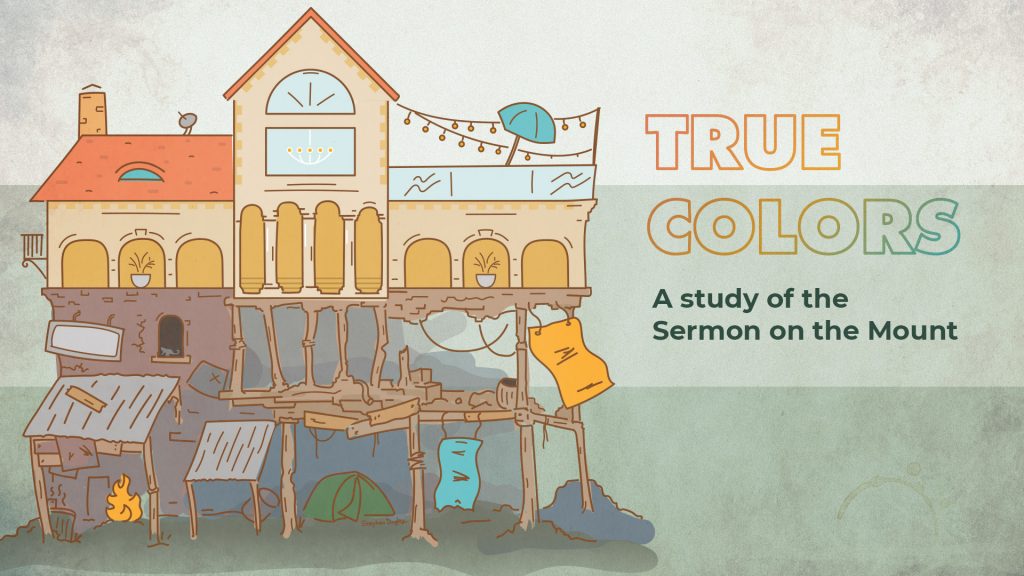Passage: Matthew 4:23-5:12
Guide for Group Discussion or Personal Reflection
Sermon Summary
Jesus created an “upside-down” kingdom by blessing those whom nobody else considered “blessed”—those with nothing. This was as revolutionary in Jesus’ day as it is in ours—and as shocking as a beggar sitting on an empty box learning the box is full of treasure.
In both Jesus’ day (and in ours) calling someone “blessed” was a way of identifying that they were a person with the qualities that marked a good and successful life. In the Beatitudes, however, Jesus pronounced his blessing, not on those who were rich, or wise, or who came from good families, but on those who had absolutely nothing—the “poor in Spirit” (5:3). The very crowds he was teaching—“those afflicted with various diseases and pains, those oppressed by demons, the paralytics” (4:23-25) were the ones he was giving his kingdom to. Jesus looked over these hurting crowds—those who felt poor inside, who mourned, who were persecuted—and revealed to them that they were the ones sitting on boxes of kingdom treasure—they would inherit the earth, they would see the face of God, they were the sons and daughters of God!
Jesus’ blessings radically subverted the status quo, because Jesus set his love and compassion on those who were all but “dead” in the world’s eyes. Therefore, the beatitudes are meant to be an encouragement to us in our need, and we shouldn’t turn them into a new type of “entry requirement” into the kingdom—boasting about how weak we are. That would be to completely miss the point! On the other hand, they are very challenging to those of us who are “middle class” in Spirit. The poor in Spirit were “brought to Jesus” (4:24). Are the poor in Spirit drawn to us as well?
The people described in the beatitudes—those with nothing—are also the ones who most truly express and extend the kingdom of God. The beatitudes, then, have a natural order to them…those who are poor in Spirit and who mourn what they’ve lost are the ones who hunger and thirst for a better world, and who work for it (in a merciful and pure way), even experiencing persecution because of this longing.
Ultimately, the Beatitudes are a picture of Jesus. He was the pure in heart, he was the one who was meek, the one who was persecuted for righteousness’ sake”. When we see Jesus and are drawn to him, we will become more like the community Jesus longs to make us into—the kind of community described in the rest of the Sermon on the Mount.
Sermon Outline:
• Jesus Blesses Those with Nothing (4:23-5:12)
• Those with Nothing Express & Extend the Kingdom (5:3-12)
Group Discussion & Personal Reflection Guide
Re-read the passage(s): Matthew 4:23-5:12
Jesus Blesses Those with Nothing (4:23-5:12)
Q) INTRO: What do you think of when you hear the word “blessed” today? In your experience, how do Christians typically use this word? How do people outside the church typically use it?
Q) Re-read Matthew 5:1-11 and meditate slowly on the Beatitudes together. Consider:
• Who is Jesus calling “blessed”?
• In what ways do you feel like you can relate…or not relate…to the people described in the beatitudes?
• Which Beatitude is most challenging for you? Why?
• What kingdom “treasures” or rewards does Jesus’ describe? Which ones do you most long for? Which are the most surprising?
Q) Pastor Bobby talked about how “upside down” the Beatitudes are. None of the Beatitudes represent postures or qualities we naturally celebrate or long to be. Think through the Beatitudes again one-by-one. How does our culture—and Christian culture—make it hard to celebrate:
• …being poor in Spirit
• …mourning
• …being meek
• …hungering and thirsting for righteousness
• …being merciful
• …being pure in heart
• …being peacemakers
• …being persecuted for righteousness’ sake
Q) In his sermon, Pastor Bobby said that Jesus gives his love and blessing to people who are all but “dead” in the world’s eyes—people who have absolutely nothing to offer. What would a community look like that was built around the shared experience of being loved, despite having nothing to offer?
Q) In his sermon, Pastor Bobby said, “the Beatitudes are meant to be encouragements, so don’t turn them into “entrance requirements” for the kingdom? What did he mean by this? How might we (inadvertently) turn the Beatitudes into “entrance requirements”?
Q) In his sermon, Pastor Bobby mentioned how hurting and broken people—the very people described in the Beautidues—were “brought” to Jesus. If you’re honest, do you find that hurting and broken people are typically drawn to you? Why or why not?
Those with Nothing Express & Extend the Kingdom (5:3-12)
Q) Pastor Bobby said that it is “those with nothing”—the kind of people described in the Beatitudes—who most express and extend God’s kingdom. Why is that so? Why is it, for example, those who are “poor in spirit” and those who “mourn, who give are most likely to be used in extending the kingdom of God?
Q) Pastor Bobby said that the Beatitudes ultimately are a picture of Jesus. How is Jesus: the poor in Spirit, the one who mourns, the meek, etc…? How does this lead you into greater worship of Jesus?
Q) What was your one main takeaway from this week’s sermon and passage? It might be:
• A thought to consider
• An attitude to embrace
• An action to take
Additional Application Questions
Q) How else would you like to engage with God this week?
Q) How can you tangibly care for those in your community this week, both inside and outside of the church?
Prayer
Spend time praying for yourselves, our church community, the North Shore community, and our nation and world—particularly those most vulnerable.

